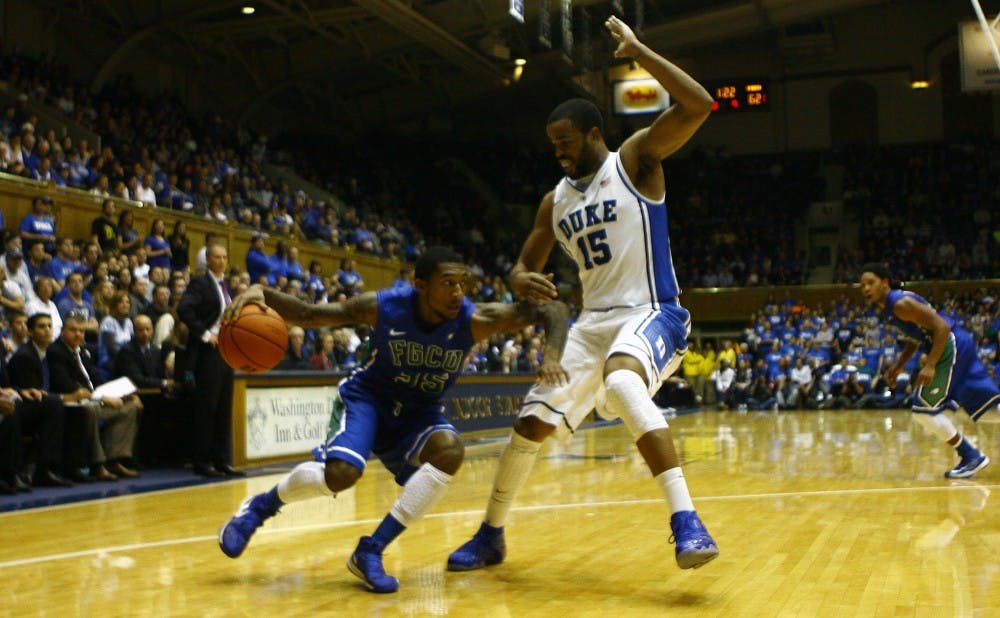Duke’s run-and-gun style of play this year may hinge on its ability to apply full-court pressure and harass opponents without committing fouls. Changes to the NCAA rulebook going into effect for the 2013-14 season are not going to do the Blue Devils any favors.
Referees will be cracking down on hand checks and other habits that defenders have developed that NCAA officials believe impede the offensive player. Rules against these tactics already exist, but have not been whistled on a consistent basis in past years.
"We are in the same position now that the NBA was in in the year 2000 or so, where their game had turned into organized wrestling matches—and that's what our game has been," ESPN college basketball analyst Jay Bilas said. "Many coaches have been admitting this, they've been teaching fouling as strategy simply because the referees will not call it."
The Blue Devils are undergoing a major transformation into a more up-tempo, high-pressure scheme this season, and now they’ll have to confine that aggressive style of play within the parameters set for defensive players by officials. Failure to do so could result in the pressure defense hurting the Blue Devils more than it helps.
“Coach wants us to be aggressive, but we have to be smart about it,” senior forward Josh Hairston said. “The new rule changes that the NCAA has passed with the referees, definitely about hand-checking and freedom of movement, there’s going to be a whole lot of fouls. You can’t put a hand on a guy anymore. You can’t bump a cutter as he goes through the lane like you used to a couple years ago.”
In preparation for the stricter enforcement of the rule book, the Duke coaching staff has pulled out the whistles at practice.
“Throughout practice Coach tries to emphasize us playing without our hands, and if he sees things he does call fouls,” Hairston said. “Guys try not to do it anymore because we have something called efficiency points. If you score, you get two points, and fouls are minus points, so if you continue to foul you’re losing points and that doesn’t reflect well at the end of practice.”
Last season, Duke averaged 17.9 fouls per contest and 22 Blue Devils fouled out of games. Hairston and classmate Tyler Thornton were Duke’s top foulers: Thornton committed 99 fouls and was disqualified six times, while Hairston committed 85 personals and fouled out of five games.
Though the seniors will have to alter their style of play, Rodney Hood, Jabari Parker, Matt Jones and Semi Ojeleye will each make their Duke debuts having never played in the Blue Devil defensive scheme under the old interpretation of the rules.
“It’s definitely a learning experience, to play solid defense without fouling and to play solid defense for a longer period of time,” sophomore forward Amile Jefferson said. “Coming off screens or fighting through screens, sometimes you just get tangled up, and you learn those things as you get more time on the court. You’re quicker, you can react to situations better and you don’t have to foul.”
In their two exhibition tilts against Bowie State and Drury, the Blue Devils committed a total of 36 fouls, allowing their opponents to spend much of the game in the bonus. Against the Panthers, Duke’s starting backcourt of Quinn Cook and Thornton each committed four fouls and were forced to play through the foul trouble as Rasheed Sulaimon sat out the game.
“It’s just something you’ve got to adjust to—it’s not like they’ll just be calling [fouls] against us,” Hairston said. “Everybody in the country will have to adjust to it and deal with it.”
The Blue Devils were able to draw 56 personal fouls in their two exhibition games, thanks in part to the improved transition game. Those fouls added up to 78 free throws attempts, but Duke converted on just 49, a 62.8 percent clip that will need to improve to make opponents pay for putting the Blue Devils on the line as Duke seeks to be the aggressors with its quicker pace of play.
One new NCAA rule for 2013-14 affects a key staple of Hairston’s game—the art of drawing charges. This year, a defensive player looking to draw a charge must be in defensive position prior to the offensive player starting his upward motion. Previously, the defender could draw a charge as long as he was in position when the offensive player left his feet.
Hairston led the Blue Devils by drawing 20 charges last season, and after losing Ryan Kelly to graduation, the Fredericksburg, Va., native is the lone consistent charge-drawer on a Duke team that has long been accused of flopping by opposing coaches and players. Hairston said drawing charges is still a priority for the Blue Devils, but that the rule change makes doing so less appealing.
“You’re not going to see as many charges this year, even in the first preseason game guys really aren’t taking charges because they know they’re not going to get [the call],” Hairston said. “We talked to Coach about it, and he still wants us to try to draw charges. The younger guys are trying to learn [how to get in position], just emphasizing seeing the ball, moving with the ball, and always being in a stance.”
Get The Chronicle straight to your inbox
Signup for our weekly newsletter. Cancel at any time.

